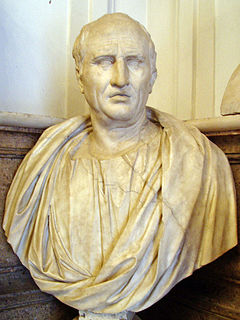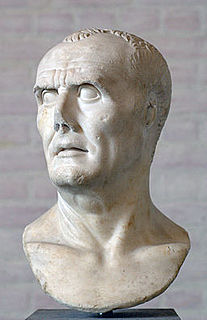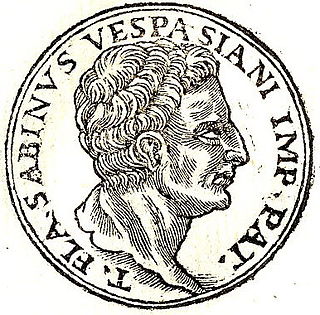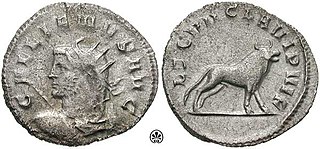 W
WMarcus Tullius Cicero was a Roman statesman, lawyer, scholar and Academic skeptic who played an important role in the politics of the late Roman Republic and in vain tried to uphold republican principles during the crises that led to the establishment of the Roman Empire. His extensive writings include treatises on rhetoric, philosophy and politics, and he is considered one of Rome's greatest orators and prose stylists. He came from a wealthy municipal family of the Roman equestrian order, and served as consul in 63 BC.
 W
WMarcus Macrinius Avitus Catonius Vindex was a Roman senator who was active during the reign of Marcus Aurelius. Originally a member of the equestrian order, Vindex demonstrated courage and intelligence that led to his award of dona militaria and elevation into the Senate, followed by his appointment to the consulate, which Géza Alföldy dates to an undetermined nundinium around the year 175.
 W
WGaius Cilnius Maecenas was a friend and political advisor to Octavian, who later reigned as Augustus. He was also an important patron for the new generation of Augustan poets, including both Horace and Virgil. During the reign of Augustus, Maecenas served as a quasi-culture minister to the Emperor but in spite of his wealth and power he chose not to enter the Senate, remaining of equestrian rank.
 W
WGaius Marius was a Roman general and statesman. Victor of the Cimbric and Jugurthine wars, he held the office of consul an unprecedented seven times during his career. He was also noted for his important reforms of Roman armies. He was at the centre of a paradigmatic shift from the militia levies of the middle Republic to the professional soldiery of the late Republic; he also improved the pilum, a javelin, and made large-scale changes to the logistical structure of the Roman army.
 W
WPublius Ovidius Naso, known as Ovid in the English-speaking world, was a Roman poet who lived during the reign of Augustus.
 W
WTitus Flavius T. f. Sabinus was a Roman eques and the father of the emperor Vespasian.
 W
WGaius Suetonius Tranquillus, commonly known as Suetonius, was a Roman historian who wrote during the early Imperial era of the Roman Empire.
 W
WTitus Terrasidius was a Roman Knight of the Equestrian order and an officer of the cavalry in Julius Caesar's Legio VII Claudia. He and other officers of the legion were sent out to negotiate provisions for the winter of 56–55 BC; they were captured by Breton tribes who were then subjugated as Caesar describes in his Commentarii de Bello Gallico:The occasion of that war was this: Publius Crassus, a young man, had taken up his winter-quarters with the seventh legion among the Andes, who border upon the Ocean. He, as there was a scarcity of corn in those parts, sent out some officers of cavalry [who would be equites], and several military tribunes [who would be of senatorial rank] among the neighbouring states, for the purpose of procuring corn and provision; in which number Titus Terrasidius was sent among the Esubii; Marcus Trebius Gallus among the Curiosolitae; Quintus Velanius, [and] Titus Silius, amongst the Veneti.
 W
WMarcus Valerius Maximianus was an important Roman general of the period of the Marcomannic Wars during the reign of Marcus Aurelius. He was born in the Roman colony of Poetovio, where his father, also called Marcus Valerius Maximianus, was a local censor and priest. He was decorated for services in the Parthian war of Lucius Verus and was appointed by Marcus Aurelius to ensure the armies in Pannonia were supplied by boats on the Danube.
 W
WPublius Vedius Pollio was a Roman of equestrian rank, and a friend of the Roman emperor Augustus, who appointed him to a position of authority in the province of Asia. In later life he became infamous for his luxurious tastes and cruelty to his slaves – when they displeased him, he had them fed to "lampreys" that he maintained for that purpose, which was deemed to be an exceedingly cruel act. When Vedius tried to apply this method of execution to a slave who broke a crystal cup, Emperor Augustus was so appalled that he not only intervened to prevent the execution but had all of Pollio's valuable drinking vessels deliberately broken. This incident, and Augustus's demolition of Vedius's mansion in Rome he inherited in his will, were frequently referred to in antiquity in discussions of ethics and of the public role of Augustus.
 W
WLucius Vitellius Veteris or the Elder was the youngest of four sons of procurator Publius Vitellius and the only one who did not die through politics. He was consul three times, which was unusual during the Roman empire for someone who was not a member of the Imperial family. The first time was in the year 34 as the colleague of Paullus Fabius Persicus; the second was in 43 as the colleague of the emperor Claudius; the third was in 47 again as the colleague of the emperor Claudius.